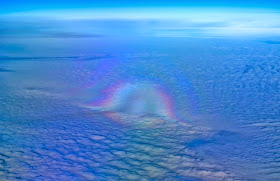Let's see how my forecasts for 2014 (links below), prepared a year ago, panned out...
First, a look at the Polish economy. Despite the massive exogenous shock that was the Russian invasion of Crimea and the Donbass, which had a negative effect on Poland's manufacturing and exports, growth was better than I'd expected. Had it not been for the ongoing Ukraine crisis, the GDP might have grown by nearer to 4%. Unemployment remains stubbornly high, although the informal economy is estimated to be soaking up around one-third of those claiming unemployment benefits. Inflation was a bigger surprise. The drop in world oil prices and the glut of food competing for buyers on the Polish market (both side-effects of the Ukraine crisis). Few would have expected that a basket of products and services would have been cheaper today than a year ago.
| Key economic indicators: Poland | ||
|---|---|---|
| My forecast | Outcome | |
| GDP growth | 3.1% (Q3 y-o-y) | 3.3% (Q3 y-o-y) |
| Unemployment | 11.0% (Nov) | 11.4% (Nov) |
| Inflation | 2.4% (Nov) | -0.6% (Nov) |
Next up, the UK. The outcome was much better than I'd forecast - the rapid rise in GDP was something that caught me (pleasantly) by surprise. Despite the downward revision of Q3 year-on-year growth from 3.0% to 2.6%, it was a whole lot better than the mild contraction I was anticipating (the British economy was teetering on the edge of a triple-dip recession this time last year). While unemployment has fallen nicely, there are major questions to be asked about job security and pay rates; zero-hour contracts and low pay are exacerbating inequality, a big socioeconomic issue in Britain. Inflation, however, is much lower, again, a by-product of tumbling oil prices.
| Key economic indicators: UK | ||
|---|---|---|
| My forecast | Outcome | |
| GDP growth | -0.3% (Q3 y-o-y) | 2.6% (Q3 y-o-y) |
| Unemployment | 6.8% (Aug-Oct) | 6.0% (Aug-Oct) |
| Inflation | 3.5% (Nov) | 1.0% (Nov) |
Finally, the bits in the middle - the eurozone (augmented from tomorrow by a 19th member country - Lithuania). Here the story has not been at all rosy. My pessimistic forecast for sluggish GDP growth proved to be spot-on, while employment across the eurozone is now officially higher than in Poland. The effects of the Russian sanctions and low oil prices have knocked back inflation way below my forecast.
| Key economic indicators: eurozone | ||
|---|---|---|
| My forecast | Outcome | |
| GDP growth | 0.8% (Q3 y-o-y) | 0.8% (Q3 y-o-y) |
| Unemployment | 10.0% (Nov) | 11.5% (Nov) |
| Inflation | 1.8% (Nov) | 0.3% (Nov) |
Currencies - 12 months ago today I predicted that 1 GBP would be 5.10 PLN (it's 5.46); 1 EUR will be 4.25 PLN (it's 4.26), and 1 GBP will be 1.20 EUR (it's 1.28). So sterling has made the biggest gain.
Forecasts for 2015? Not me, mister. Too many known and unknown unknowns. The known unknowns are the elections taking place in Poland (presidential and parliamentary) and in the UK (parliamentary). In both cases, the results are too close to call and on both cases may result in a nutty party or a nutty coalition focused on the wrong agenda making major macroeconomic blunders.
Secondly, the big global worry - the reemergence of Russia as a rogue state - may have macroeconomic effects that 12 months from now will be completely unpredictable from today's perspective. And the unknown unknowns - who could have predicted a year ago the impact that Putin's Ukrainian incursions, Islamic State and the Ebola virus would have on the world. [Indeed. Have a look at what the BBC's experts focused on as the Big Stories coming up in 2014 - none of the above were mentioned.]
Property prices are extremely interesting, especially for those with a foot in both Poland and the UK. Britain's property market is slowing down, although London continues to be a magnet for flight capital. The prices that the wealthy from around the world are prepared to pay for prime Central London property ripples out to the suburbs. This causes run-of-the-mill terraced housing in places like Greenford and Ickenham to cost as much as three (or even four) such houses in Derby or Nottingham or Hull. The effect is that young people are fleeing London; before long, London will hollow out as no one serving the hyper-rich residents in the city's centre will be able to afford to live even in Zone 6. Plus, George Osborne's new taxes on non-domiciled property owners (capital gains tax on sales, no tax breaks on rental incomes) will make it less attractive to own London property as an investment vehicle.
Meanwhile, a thousand miles to the east, property prices in Warsaw continue flat, despite the rapid growth in GDP. My guess is that wealthier Poles would rather invest in their businesses than in real estate at this moment in time.
This time last year:
Economic predictions for 2014
This time two years ago:
Economic predictions for 2013
This time three years ago:
Economic predictions for 2012
This time four years ago:
Classic cars, West Ealing
This time five years ago:
Jeziorki 2009, another view
This time six years ago:
Jeziorki 2008, another view
This time seven years ago:
Final thoughts for 2007





































.jpg)
.jpg)
.jpg)
.jpg)
.jpg)
.jpg)
.jpg)





